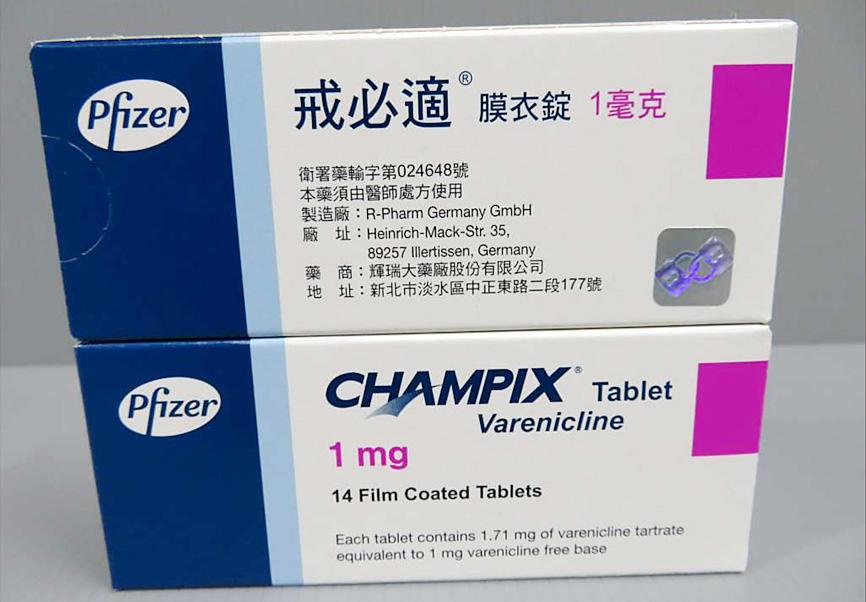US biotechnology firm Pfizer is recalling four lots of Champix anti-smoking tablets in Taiwan after elevated levels of nitrosamine impurities were found in the prescription drug, the Food and Drug Administration (FDA) said yesterday.
Hung Kuo-teng (洪國登), head of the FDA’s Medicinal Products Division, said that about 600,000 Champix pills with the four lot numbers 00019669, 00019012, 00019601 and 00019602 are to be recalled by July 22.
The announcement came after Pfizer said that it found elevated levels of nitrosamines in Chantix, the name under which Champix is sold in the US.

Photo courtesy of the Food and Drug Administration via CNA
Hung said that Pfizer is investigating the situation.
The US Food and Drug Administration in a report in February identified seven nitrosamine impurities that could theoretically be present in medicines, adding that five of them have been detected.
Bloomberg reported that they include N-nitrosodimethylamine (NDMA), which is suspected to increase the risk of cancer, and that US health authorities have asked drugmakers to test their products for the impurities.
Pfizer’s Taiwanese subsidiary yesterday said in a statement that impurities that had been found in Champix’s active component, varenicline, include nitrosamines, but not NDMA or any other impurities mentioned in the US report.
International media reported that Pfizer has yet to determine the health risk posed by nitrosamines, but it has halted the global distribution of the anti-smoking drugs and is recalling the affected lots.
In Taipei, the FDA said that medical institutions and pharmacies should stop prescribing and dispensing Champix, adding that they should return the product.
People concerned about their use of the medication should immediately consult their doctors, the agency said.

The first global hotel Keys Selection by the Michelin Guide includes four hotels in Taiwan, Michelin announced yesterday. All four received the “Michelin One Key,” indicating guests are to experience a “very special stay” at any of the locations as the establishments are “a true gem with personality. Service always goes the extra mile, and the hotel provides much more than others in its price range.” Of the four hotels, three are located in Taipei and one in Taichung. In Taipei, the One Key accolades were awarded to the Capella Taipei, Kimpton Da An Taipei and Mandarin Oriental Taipei. Capella Taipei was described by

The Taichung District Court yesterday confirmed its final ruling that the marriage between teenage heir Lai (賴) and a man surnamed Hsia (夏) was legally invalid, preventing Hsia from inheriting Lai’s NT$500 million (US$16.37 million) estate. The court confirmed that Hsia chose not to appeal the civil judgement after the court handed down its ruling in June, making the decision final. In the June ruling, the court said that Lai, 18, and Hsia, 26, showed “no mutual admiration before the marriage” and that their interactions were “distant and unfamiliar.” The judge concluded that the couple lacked the “true intention of

EVA Airways today confirmed the death of a flight attendant on Saturday upon their return to Taiwan and said an internal investigation has been launched, as criticism mounted over a social media post accusing the airline of failing to offer sufficient employee protections. According to the post, the flight attendant complained of feeling sick on board a flight, but was unable to take sick leave or access medical care. The crew member allegedly did not receive assistance from the chief purser, who failed to heed their requests for medical attention or call an ambulance once the flight landed, the post said. As sick

INDUSTRY: Beijing’s latest export measures go beyond targeting the US and would likely affect any country that uses Chinese rare earths or related tech, an academic said Taiwanese industries could face significant disruption from China’s newly tightened export controls on rare earth elements, as much of Taiwan’s supply indirectly depends on Chinese materials processed in Japan, a local expert said yesterday. Kristy Hsu (徐遵慈), director of the Taiwan ASEAN Studies Center at the Chung-Hua Institution for Economic Research, said that China’s latest export measures go far beyond targeting the US and would likely affect any country that uses Chinese rare earths or related technologies. With Japan and Southeast Asian countries among those expected to be hit, Taiwan could feel the impact through its reliance on Japanese-made semi-finished products and